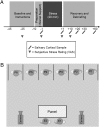Common oxytocin receptor gene (OXTR) polymorphism and social support interact to reduce stress in humans
- PMID: 22123970
- PMCID: PMC3250137
- DOI: 10.1073/pnas.1113079108
Common oxytocin receptor gene (OXTR) polymorphism and social support interact to reduce stress in humans
Abstract
The neuropeptide oxytocin has played an essential role in the regulation of social behavior and attachment throughout mammalian evolution. Because recent studies in humans have shown that oxytocin administration reduces stress responses and increases prosocial behavior, we investigated whether a common single nucleotide polymorphism (rs53576) in the oxytocin receptor gene (OXTR) might interact with stress-protective effects of social support. Salivary cortisol samples and subjective stress ratings were obtained from 194 healthy male participants before, during, and after a standardized psychosocial laboratory stress procedure. Participants were randomly assigned either to prepare alone or to receive social support from their female partner or close female friend while preparing for the stressful task. Differential stress responses between the genotype groups were observed depending on the presence or absence of social support. Only individuals with one or two copies of the G allele of rs53576 showed lower cortisol responses to stress after social support, compared with individuals with the same genotype receiving no social support. These results indicate that genetic variation of the oxytocin system modulates the effectiveness of positive social interaction as a protective buffer against a stressful experience.
Conflict of interest statement
The authors declare no conflict of interest.
Figures



References
-
- Baumeister RF, Leary MR. The need to belong: Desire for interpersonal attachments as a fundamental human motivation. Psychol Bull. 1995;117:497–529. - PubMed
-
- Cohen S. Psychosocial models of the role of social support in the etiology of physical disease. Health Psychol. 1988;7:269–297. - PubMed
-
- Uchino BN, Cacioppo JT, Kiecolt-Glaser JK. The relationship between social support and physiological processes: A review with emphasis on underlying mechanisms and implications for health. Psychol Bull. 1996;119:488–531. - PubMed
-
- Seeman TE. Health promoting effects of friends and family on health outcomes in older adults. Am J Health Promot. 2000;14:362–370. - PubMed
Publication types
MeSH terms
Substances
LinkOut - more resources
Full Text Sources
Other Literature Sources
Medical

